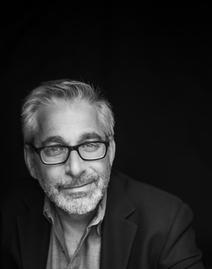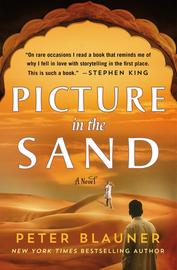
|
|
| (photo: Michael Parmalee) | |
Peter Blauner is the author of nine novels, including Slow Motion Riot, winner of an Edgar Allan Poe Award for best first novel from the Mystery Writers of America, and the bestselling The Intruder. He began his career as a journalist for New York magazine in the 1980s and segued into writing fiction in the 1990s. He has been a staff writer for several television shows, including Law & Order: SVU and Blue Bloods. He lives in Brooklyn, N.Y., with his wife, author Peg Tyre. Shelf Awareness spoke with Blauner about Picture in the Sand (Minotaur, $27.99, reviewed in this issue), a novel about the filming of The Ten Commandments on location in 1950s Egypt in the midst of national turmoil.
Tell us about the inspiration for Picture in the Sand.
I started writing this book in the spring of 2002, when everyone I knew in New York was still reeling from the Twin Towers attacks. Part of the Passover/Easter holiday tradition used to be the showing of Cecil B. DeMille's film The Ten Commandments on network TV. On that particular night, everyone had a hard time settling down for the holiday meal, so I found myself watching from the beginning. The credits rolled--Charlton Heston, Yul Brynner, Yvonne DeCarlo--and then it said the pharaoh's army was played by the Cavalry Corps of the Egyptian Armed Forces.
That was the moment when everything came together for me. I knew the movie came out in 1956 and must have taken two years to shoot. I also knew that Egypt in 1954 was ground zero for modern-day terrorism, with the military fighting the Muslim Brotherhood for control of the country. That meant the most extravagant Hollywood production in movie history was shot in the midst of that turmoil. I figured it would be a cinch to bang this book out in no time. Then I spent 20 years working on it.
As a young man, Ali Hassan is fascinated by the glamour of Hollywood, and dreams of living in America. How do his dreams differ from the eventual reality he encounters?
Ali Hassan gets a job working as Cecil B. DeMille's assistant and he thinks he's going to get the American Dream. He's going to follow the great man back to the States, he's going to change his name to Al Harrison, he's going to get a nice house in Pasadena, drive a Plymouth, marry the woman he loves, get a swimming pool and... well, it doesn't quite work out that way. Suffice to say that he goes through a lot. And some of it is brutal and heartbreaking. But I don't think he winds up disillusioned at all. He doesn't become a big Hollywood mogul. And he goes through some pain and family sorrow, like we all do. But in the end, Ali achieves a more realistic version of the American Dream, a little frayed and battered, but something he can feel at peace with when he closes his eyes.
Ali decides to share his life story with his grandson, Alex, hoping it will help him to make better (or simply different) decisions. How does Ali's action demonstrate the power of sharing our stories?
Without giving the whole plot away, hearing the story of the unlikely friendship Ali formed with a former enemy, from another faith, in 1954 has a direct effect on the way Alex, his grandson, treats a so-called enemy combatant from that same faith in our era. As a direct result of hearing that story, the grandson makes the decision that ultimately diverts him from the dangerous path he was on and directs him toward a very different future.
I don't think centuries of ethnic hatred turn to love overnight. I do know that I've sometimes changed my mind about individuals after hearing their whole story. That lunatic teacher you had in fifth grade is a more sympathetic figure when you find out he was a prisoner of war. If a book changes the way you look at the world--even just a little bit--then it was worth the time you spent reading it.
Alex's perspective on his grandfather's adventures changes dramatically as he reads Ali's story. Can you talk about the shifts in his point of view?
Alex, the grandson, begins the book in a state of disgust with America and with the modern world in general. Like a lot of angry men, he's bought into the myth of a heroic past when things were somehow more noble. He wants to be a holy warrior. And he wants to find himself a wife. He thinks no one in his family will ever understand him. But his grandfather Ali knows better. He's not only seen this movie before; he's lived it. But he's kept it a secret from his family until now.
So part of the story within the story is the grandfather gradually revealing that secret and the grandson growing up enough to understand it. I think part of the reason it took me so long to write the book is that I needed to get some perspective of my own. It's an historical novel, but I wanted to make sure it has something to say to people today.
 The novel explores the tensions between certain Eastern and Western ideologies in the 1950s and the present day. How do you think this tension is still relevant today?
The novel explores the tensions between certain Eastern and Western ideologies in the 1950s and the present day. How do you think this tension is still relevant today?
I think that distorted looking glass goes both ways. In America, we have a lot of stereotypical ideas about people in the Middle East. The scholar Edward Said called it "Orientalism." But there's also "Occidentalism": people in the Middle East stereotyping Westerners. I saw that in the six times I went to Egypt, researching the novel. I heard a lot of hopes and ambitions from young people that almost any American would identify with. But I also heard some broad statements about Western licentiousness and materialism that didn't always ring true.
The irony is that this novel takes place in 1954, at a moment when those two cultures seemed to be coming together. Egypt had just cast off centuries of oppression and outside interference to become an independent republic. America had an obsession with the Middle East that could have moved beyond exoticism. A sub-theme in the novel is why that romance fell apart.
The novel is set against a backdrop of turbulent Egyptian politics. How does this background inform the modern-day storyline where Alex joins a jihadist group?
Some of the exact same things are happening today. The tension between West and East, between religious extremism and the attraction to pop culture, between faith and hopelessness. Ali and his grandson both feel those tensions within themselves. They both have this conflicted relationship with popular culture and America.
For Ali, the grandfather, it's about classic Hollywood and realizing that's never going to be his world. For Alex, it's about video games and questioning what kind of future he has in the West. They both flirt with religious extremism and violence. They both grapple with a sense of destiny, trying to decide if everything is preordained or a matter of human will. At the end of the day, both the grandfather and the grandson are a couple of down-to-earth guys from Brooklyn (and the Middle East) looking for love in all the wrong places. --Katie Noah Gibson

